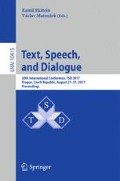Abstract
In this paper we explore the possibilities of hidden Markov model based automatic phonetic segmentation with the Kaldi toolkit. We compare the Kaldi toolkit and the Hidden Markov Model Toolkit (HTK) in terms of segmentation accuracy. The well-tuned HTK-based phonetic segmentation framework was taken as the baseline and compared to a newly proposed segmentation framework built from the default examples and recipes available in the Kaldi repository. Since the segmentation accuracy of the HTK-based system was significantly higher than that of the Kaldi-based system, the default Kaldi setting was modified with respect to pause model topology, the way of generating phonetic questions for clustering, and the number of Gaussian mixtures used during modeling. The modified Kaldi-based system achieved results comparable to those obtained by HTK—slightly worse for small segmentation errors but better for gross segmentation errors. We also confirmed that, for both toolkits, the standard three-state left-to-right model topology was significantly outperformed by a modified five-state left-to-right topology, especially with respect to small segmentation errors.
This research was supported by the Technology Agency of the Czech Republic (TA CR), project No. TH02010307.
Access this chapter
Tax calculation will be finalised at checkout
Purchases are for personal use only
References
Aylett, M.P., Dall, R., Ghoshal, A., Henter, G.E., Merritt, T.: A Flexible Front-End for HTS. In: INTERSPEECH, pp. 1283–1287. Singapore (2014)
Brognaux, S., Drugman, T.: HMM-based speech segmentation: improvements of fully automatic approaches. IEEE/ACM Trans. Audio Speech Lang. Process. 24(1), 5–15 (2016)
Kala, J., Matoušek, J.: Very fast unit selection using Viterbi search with zero-concatenation-cost chains. In: IEEE International Conference on Acoustics Speech and Signal Processing, Florence, Italy, pp. 2569–2573 (2014)
Matoušek, J.: Automatic pitch-synchronous phonetic segmentation with context-independent HMMs. In: Matoušek, V., Mautner, P. (eds.) TSD 2009. LNCS, vol. 5729, pp. 178–185. Springer, Heidelberg (2009). doi:10.1007/978-3-642-04208-9_27
Matoušek, J., Romportl, J.: On building phonetically and prosodically rich speech corpus for text-to-speech synthesis. In: IASTED International Conference on Computational Intelligence, San Francisco, USA, pp. 442–447 (2006)
Matoušek, J., Romportl, J.: Automatic pitch-synchronous phonetic segmentation. In: INTERSPEECH, Brisbane, Australia, pp. 1626–1629 (2008)
Matoušek, J., Tihelka, D., Psutka, J.: Automatic segmentation for Czech concatenative speech synthesis using statistical approach with boundary-specific correction. In: INTERSPEECH, Geneva, Switzerland, pp. 301–304 (2003)
Matoušek, J., Tihelka, D., Psutka, J.: Experiments with automatic segmentation for Czech speech synthesis. In: Matoušek, V., Mautner, P. (eds.) TSD 2003. LNCS, vol. 2807, pp. 287–294. Springer, Heidelberg (2003). doi:10.1007/978-3-540-39398-6_41
Matoušek, J., Tihelka, D., Romportl, J.: Building of a speech corpus optimised for unit selection TTS synthesis. In: Language Resources and Evaluation Conference, Marrakech, Morocco, pp. 1296–1299 (2008)
Ogbureke, K.U., Carson-Berndsen, J.: Improving initial boundary estimation for HMM-based automatic phonetic segmentation. In: INTERSPEECH, Brighton, Great Britain, pp. 884–887 (2009)
Patc, Z., Mizera, P., Pollak, P.: Phonetic segmentation using KALDI and reduced pronunciation detection in causal Czech speech. In: Král, P., Matoušek, V. (eds.) TSD 2015. LNCS, vol. 9302, pp. 433–441. Springer, Cham (2015). doi:10.1007/978-3-319-24033-6_49
Plátek, O., Jurčíček, F.: Integration of an on-line Kaldi speech recogniser to the Alex dialogue systems framework. In: Text, Speech and Dialogue. LNCS, vol. 9302, pp. 433–441. Springer, Heidelberg (2015)
Potard, B., Aylett, M.P., Baude, D.A.: Idlak Tangle: an open source Kaldi based parametric speech synthesiser based on DNN. In: INTERSPEECH, San Francisco, USA, pp. 2293–2297 (2016)
Povey, D., Ghoshal, A., Boulianne, G., Burget, L., Glembek, O., Goel, N., Hannemann, M., Motlicek, P., Qian, Y., Schwarz, P., Silovsky, J., Stemmer, G., Vesely, K.: The Kaldi speech recognition toolkit. In: IEEE Workshop on Automatic Speech Recognition and Understanding, Hawaii, USA, pp. 1–4 (2011)
Psutka, J., Švec, J., Psutka, J.V., Vaněk, J., Pražák, A., Šmídl, L., Ircing, P.: System for fast lexical and phonetic spoken term detection in a Czech cultural heritage archive. EURASIP J. Audio Speech Music Process. 10 (2011)
Rendel, A., Sorin, A., Hoory, R., Breen, A.: Towards automatic phonetic segmentation for TTS. In: IEEE International Conference on Acoustics Speech and Signal Processing, Kyoto, Japan, pp. 4533–4536 (2012)
Švec, J., Šmídl, L.: On the use of phoneme lattices in spoken language understanding. In: Habernal, I., Matoušek, V. (eds.) TSD 2013. LNCS, vol. 8082, pp. 369–377. Springer, Heidelberg (2013). doi:10.1007/978-3-642-40585-3_47
Toledano, D., Gomez, L., Grande, L.: Automatic phonetic segmentation. IEEE Trans. Speech Audio Process. 11(6), 617–625 (2003)
Young, S., Evermann, G., Gales, M.J.F., Hain, T., Kershaw, D., Liu, X., Moore, G., Odell, J., Ollason, D., Povey, D., Valtchev, V., Woodland, P.: HTK Book (for HTK Version 3.4). The Cambridge University, Cambridge, U.K. (2006)
Zen, H., Nose, T., Yamagishi, J., Sako, S., Masuko, T., Black, A.W., Tokuda, K.: The HMM-based speech synthesis system (HTS) version 2.0. In: Speech Synthesis Workshop, Bonn, Germany, pp. 294–299 (2007)
Author information
Authors and Affiliations
Corresponding author
Editor information
Editors and Affiliations
Rights and permissions
Copyright information
© 2017 Springer International Publishing AG
About this paper
Cite this paper
Matoušek, J., Klíma, M. (2017). Automatic Phonetic Segmentation Using the Kaldi Toolkit. In: Ekštein, K., Matoušek, V. (eds) Text, Speech, and Dialogue. TSD 2017. Lecture Notes in Computer Science(), vol 10415. Springer, Cham. https://doi.org/10.1007/978-3-319-64206-2_16
Download citation
DOI: https://doi.org/10.1007/978-3-319-64206-2_16
Published:
Publisher Name: Springer, Cham
Print ISBN: 978-3-319-64205-5
Online ISBN: 978-3-319-64206-2
eBook Packages: Computer ScienceComputer Science (R0)

